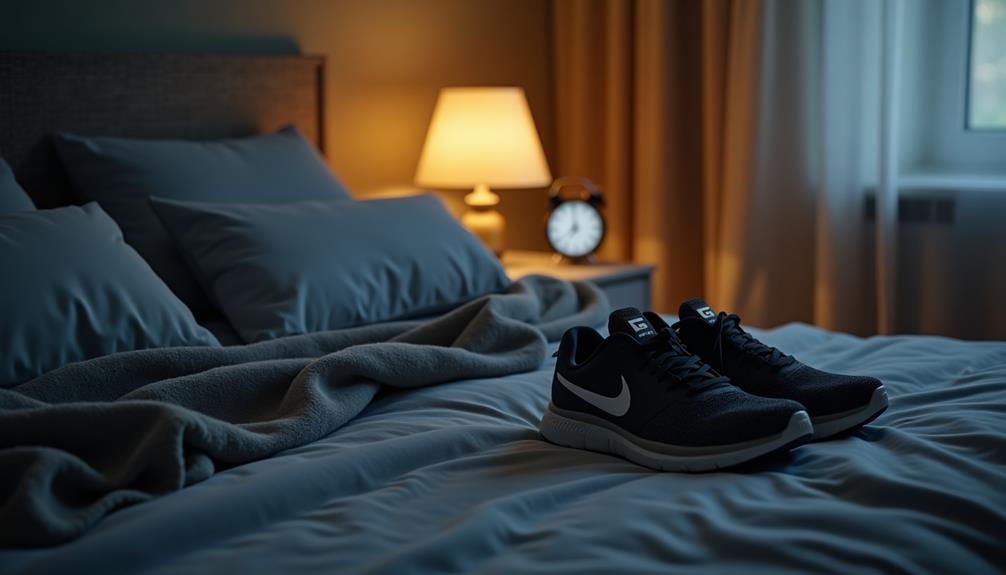Minimizing fatigue after resistance workouts requires focus on hydration, nutrition, and recovery. First, stay hydrated before, during, and after your sessions to replenish lost fluids. Prioritize nutrition by consuming protein, carbohydrates, and antioxidant-rich foods. Incorporate active recovery, like light walking or yoga, to promote muscle recovery. Guarantee you get adequate sleep each night for muscle repair. Manage stress through relaxation techniques, as it affects your recovery. Use proper techniques and form during workouts to avoid injuries. Finally, consider supplements like protein powder or electrolytes to aid in recovery. There's more valuable info on enhancing your post-workout routine ahead.
Core Insights
- Stay hydrated by drinking water before, during, and after workouts to replenish lost fluids and minimize fatigue.
- Prioritize nutrition by consuming protein, healthy fats, and carbohydrates to support muscle recovery and energy levels.
- Incorporate active recovery activities like walking or gentle yoga for 20-30 minutes post-workout to enhance blood flow and reduce fatigue.
- Ensure adequate sleep by maintaining a regular schedule and creating a calming environment to support muscle repair and overall recovery.
- Manage stress through relaxation techniques and regular physical activity to improve recovery and performance after resistance workouts.
Stay Hydrated

Staying hydrated is essential for minimizing fatigue after resistance workouts. When you exercise, your body loses water through sweat and breathing, which can lead to dehydration. This, in turn, can make you feel more tired and sluggish. To combat this, drink water before, during, and after your workouts. Aim for at least 16-20 ounces of water a couple of hours before you start. Keep a water bottle handy during your session and sip regularly. After your workout, replenish lost fluids to aid recovery. You might also consider electrolyte-rich coconut water or sports drinks if you're exercising intensely or for extended periods, as they can help replace essential minerals lost through sweat. Remember, staying properly hydrated helps maintain your energy levels and supports your overall performance. Make hydration a priority in your routine.
Prioritize Nutrition

| Nutrient Type | Food Examples |
|---|---|
| Protein | Chicken, Greek yogurt |
| Carbohydrates | Quinoa, sweet potatoes |
| Healthy Fats | Avocado, nuts |
| Hydrating Foods | Watermelon, cucumber |
| Antioxidants | Berries, spinach |
Incorporate Active Recovery

Incorporating active recovery into your routine can enhance your overall performance and reduce fatigue. Active recovery involves engaging in low-intensity activities that promote blood flow and aid muscle recovery. Instead of complete rest, consider activities like walking, cycling, or gentle yoga. These exercises help flush out lactic acid and decrease soreness. Using foam rollers for myofascial release can also be an effective part of your active recovery routine, helping to target specific muscle groups and improve flexibility.
Aim for 20 to 30 minutes of light activity after your resistance workouts. This approach keeps your body moving while allowing your muscles to recover. Listen to your body; if you feel too fatigued, adjust the intensity of your active recovery. Ultimately, the goal is to maintain movement without placing additional strain on your muscles. By making active recovery a part of your routine, you'll feel fresher and more prepared for your next workout.
Get Adequate Sleep

Many underestimate the impact of sleep on recovery after resistance workouts. Quality sleep is important for your body to repair and rebuild muscle tissue. Vitamin D3 supplementation can also support muscle recovery and immune function, which is necessary for athletes. Proper vitamin D levels help maintain overall health and reduce the risk of bone injuries. Here are some key tips to make sure you get adequate rest:
- Set a Regular Schedule: Go to bed and wake up at the same time daily to regulate your body's internal clock.
- Create a Calming Environment: Make your bedroom conducive to sleep by keeping it dark, cool, and quiet.
- Limit Screen Time: Avoid electronic devices at least an hour before bed to reduce blue light exposure, which can disrupt sleep.
- Practice Relaxation Techniques: Incorporate activities like reading or deep breathing to help calm your mind before sleep.
Manage Stress Levels

While you focus on your resistance workouts, managing stress levels is essential for optimizing recovery and performance. High stress can lead to fatigue, making it harder to bounce back after your sessions. Start by identifying your stressors, whether they're work-related, personal, or fitness-related. Once you know what's bothering you, you can take steps to address it.
Incorporating relaxation techniques, like deep breathing or meditation, can help lower stress. Regular physical activity outside of your workouts can also be beneficial, as it releases endorphins and improves mood. Establishing a routine that includes time for hobbies or socializing can further reduce stress. Remember, a balanced lifestyle contributes to better recovery and enhances your overall performance in the gym.
Use Proper Techniques

Managing stress sets a strong foundation for your workouts, but using proper techniques during resistance training takes your performance to the next level. When you focus on technique, you not only enhance your results but also reduce the risk of injury and fatigue. Here are some essential tips:
- Warm Up: Always start with a dynamic warm-up to prepare your muscles.
- Maintain Form: Keep your body aligned; proper posture helps distribute the weight evenly.
- Control Your Movements: Use controlled motions, avoiding jerky movements to minimize strain.
- Breathe: Don't forget to breathe! Inhale during the eccentric phase and exhale during the concentric phase to maintain energy.
Consider Supplements

To boost your recovery and minimize fatigue after resistance workouts, consider incorporating supplements into your regimen. Protein powders can help repair and build muscle, promoting faster recovery. Creatine is another popular choice, enhancing strength and reducing post-workout fatigue. Omega-3 fatty acids support joint health and decrease inflammation, which can be beneficial after intense sessions.
Additionally, look into branched-chain amino acids (BCAAs) to decrease muscle soreness and fatigue. Electrolyte supplements can replenish lost minerals, keeping you hydrated and energized.
Always consult with a healthcare provider before starting any new supplement. They can help you determine what's best for your individual needs. By strategically using supplements, you can enhance your recovery and feel ready for your next workout sooner.
Frequently Asked Questions
How Can I Tell if I'm Overtraining?
To determine if you're overtraining, watch for persistent fatigue, decreased performance, and mood swings. If you're struggling to recover, feeling achy, or losing motivation, it's time to reassess your workout intensity and recovery strategies.
What Role Does Breathing Play During Resistance Workouts?
Breathing's essential during resistance workouts. You should exhale during exertion and inhale during relaxation. This helps maintain oxygen flow, supports endurance, and enhances performance, allowing you to lift more effectively and recover faster.
Should I Change My Routine Frequently?
Imagine your muscles craving variety, yearning for challenges. Yes, you should change your routine frequently. It keeps your workouts exciting, boosts motivation, and prevents plateaus, ensuring you continue to grow stronger and more resilient.
Can Music Influence My Workout Performance?
Music can boost your motivation, enhance your mood, and improve your performance. By choosing upbeat tracks, you'll find yourself pushing harder and enjoying your workouts more, making each session feel more energizing and rewarding.
How Does Motivation Affect Workout Recovery?
Motivation fuels your commitment, energizes your efforts, and enhances your recovery. When you're motivated, you push harder, embrace rest, and remain focused, leading to quicker recovery times and a stronger return to your workouts.

